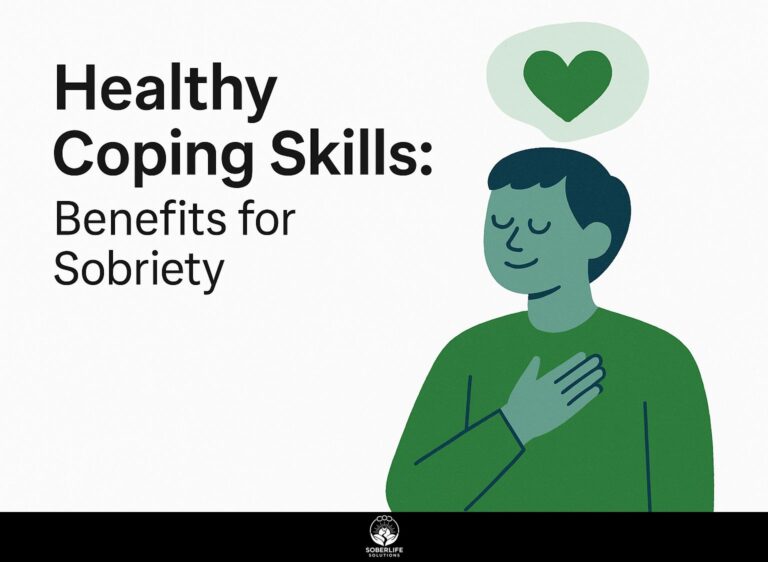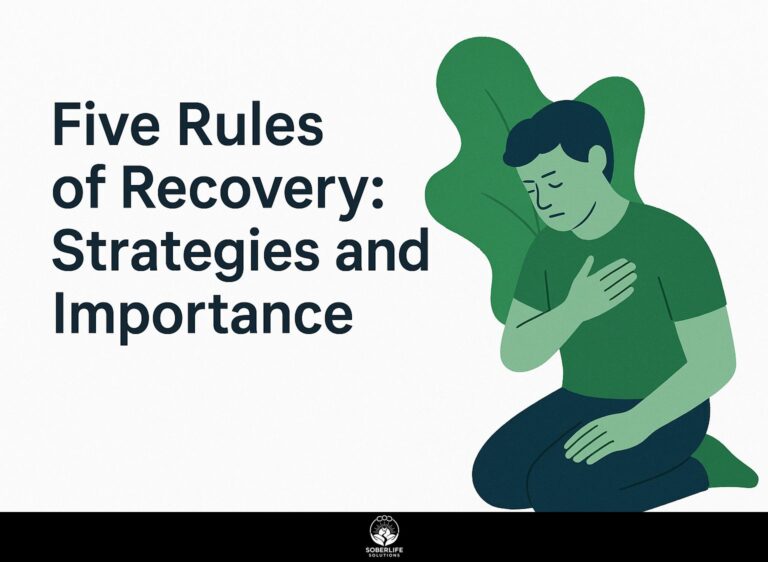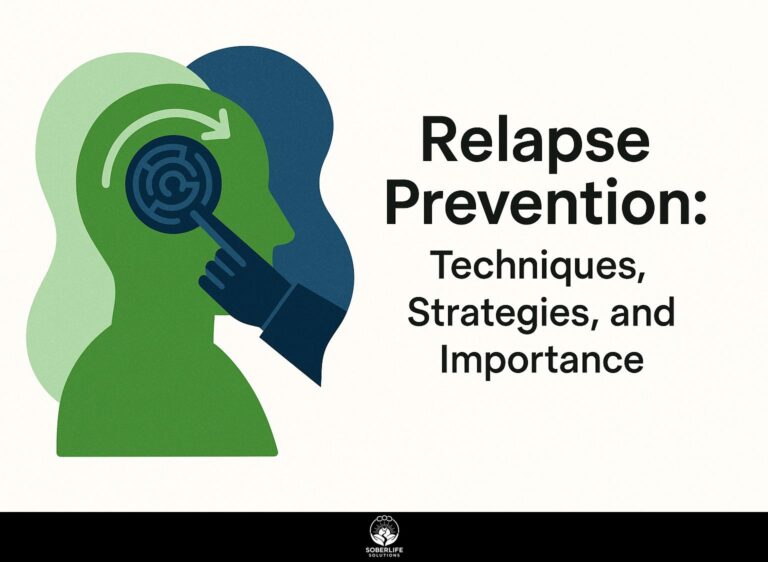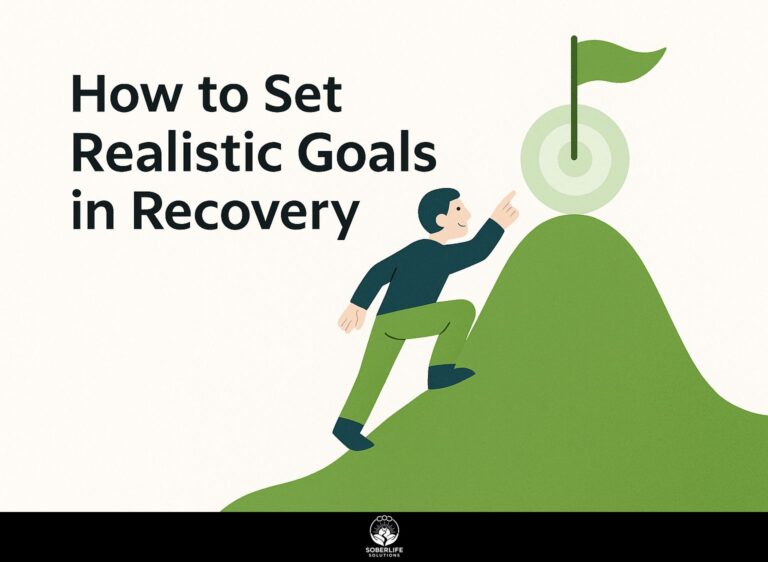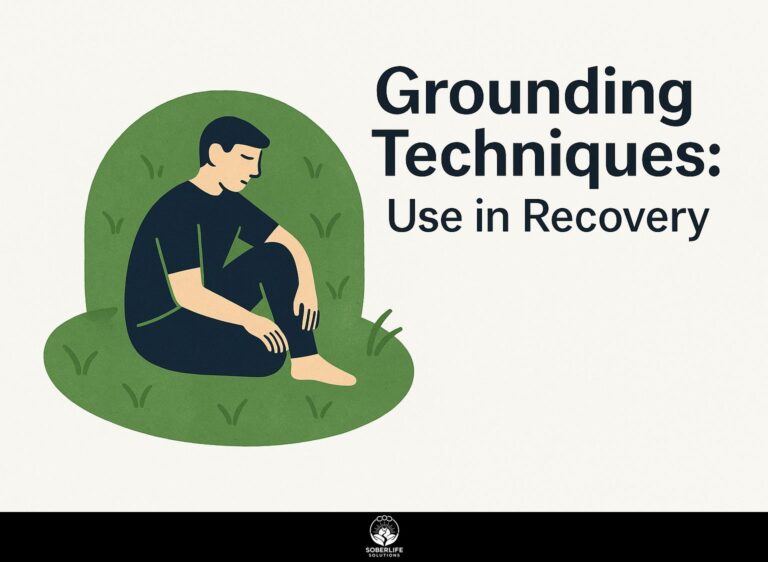Abstinence Self-Efficacy: How to Build It
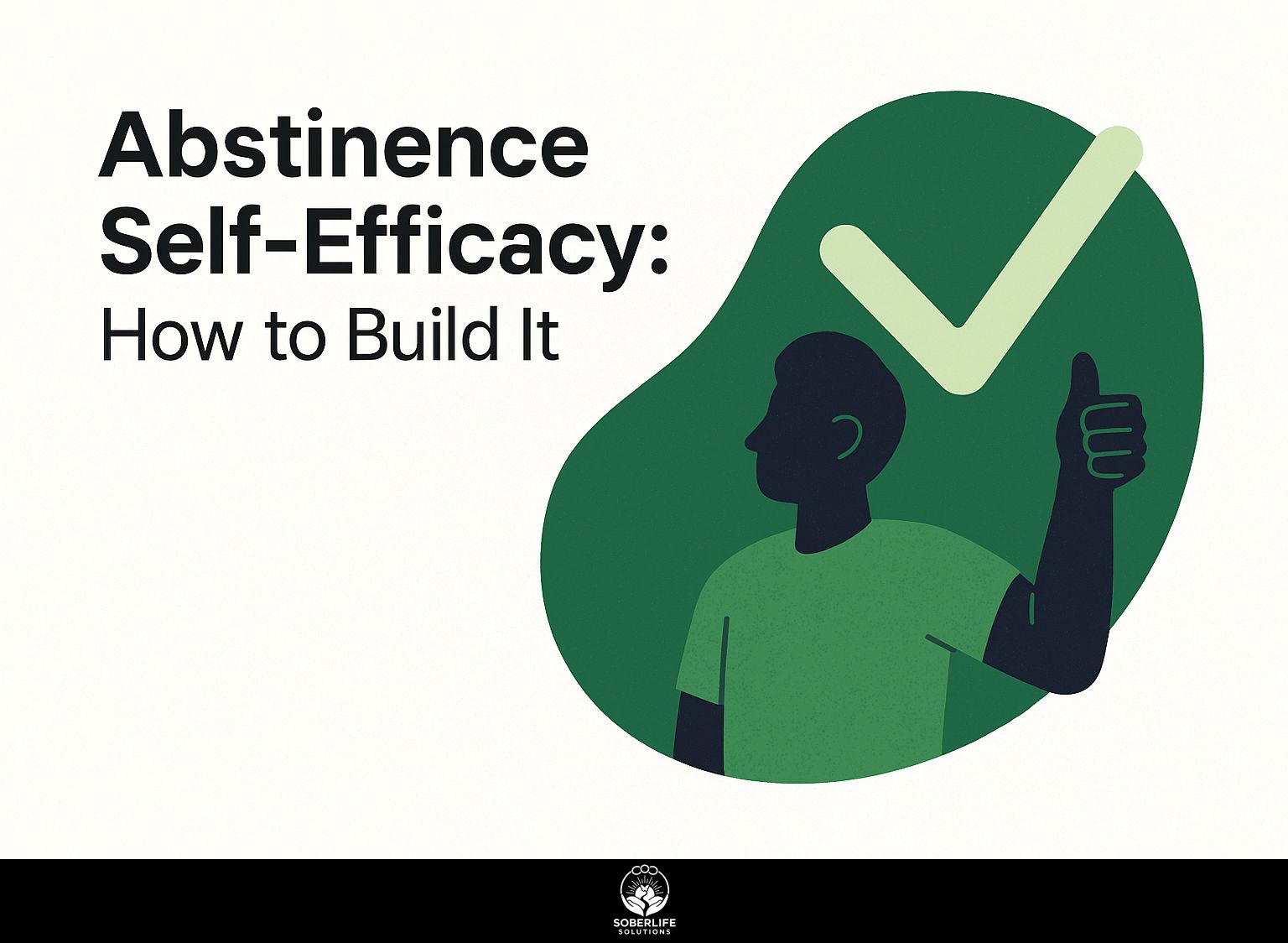
Gaining confidence in staying away from alcohol is important for people trying to stop being dependent on it. By enhancing your confidence in resisting urges, you can significantly improve treatment outcomes. The Alcohol Abstinence Self-Efficacy scale (AASE), created by Prochaska, helps us understand this process better. In this article, we’ll discuss useful methods to increase your belief in yourself, helping you live a healthier life without alcohol.
Key Takeaways:
Definition and Importance
Self-efficacy means a person believes they can do tasks needed to achieve certain goals.
In addiction and recovery, confidence in oneself is important for handling difficult situations, like triggers or cravings.
For example, a person with high self-efficacy may confidently resist the urge to use substances when faced with social pressures, while someone with low self-efficacy might struggle.
Building self-efficacy can be achieved through techniques like cognitive-behavioral therapy, which reinforces positive coping strategies. According to Verywell Mind, CBT is particularly effective in providing these strategies, or through support groups that offer shared experiences and encouragement.
Increased confidence is connected to better strength and more success in sticking with long-term recovery.
Impact on Behavior Change
Research indicates that higher levels of self-efficacy are associated with lower rates of relapse in substance use disorders, demonstrating its importance in behavior change.
Self-efficacy, defined as an individual’s belief in their ability to succeed, significantly impacts recovery. People with strong confidence in their abilities show a 30% decrease in relapse rates because they often use helpful coping methods and look for help from support groups. Notably, a study published on ResearchGate underscores the significant influence self-efficacy has on addiction recovery and relapse prevention, further validating these findings.
Ways to improve self-confidence include:
- Setting small, achievable goals, such as attending weekly support groups
- Employing visualization strategies to imagine successful outcomes
These methods can increase confidence and lead to positive changes in behavior.
Understanding Self-Efficacy
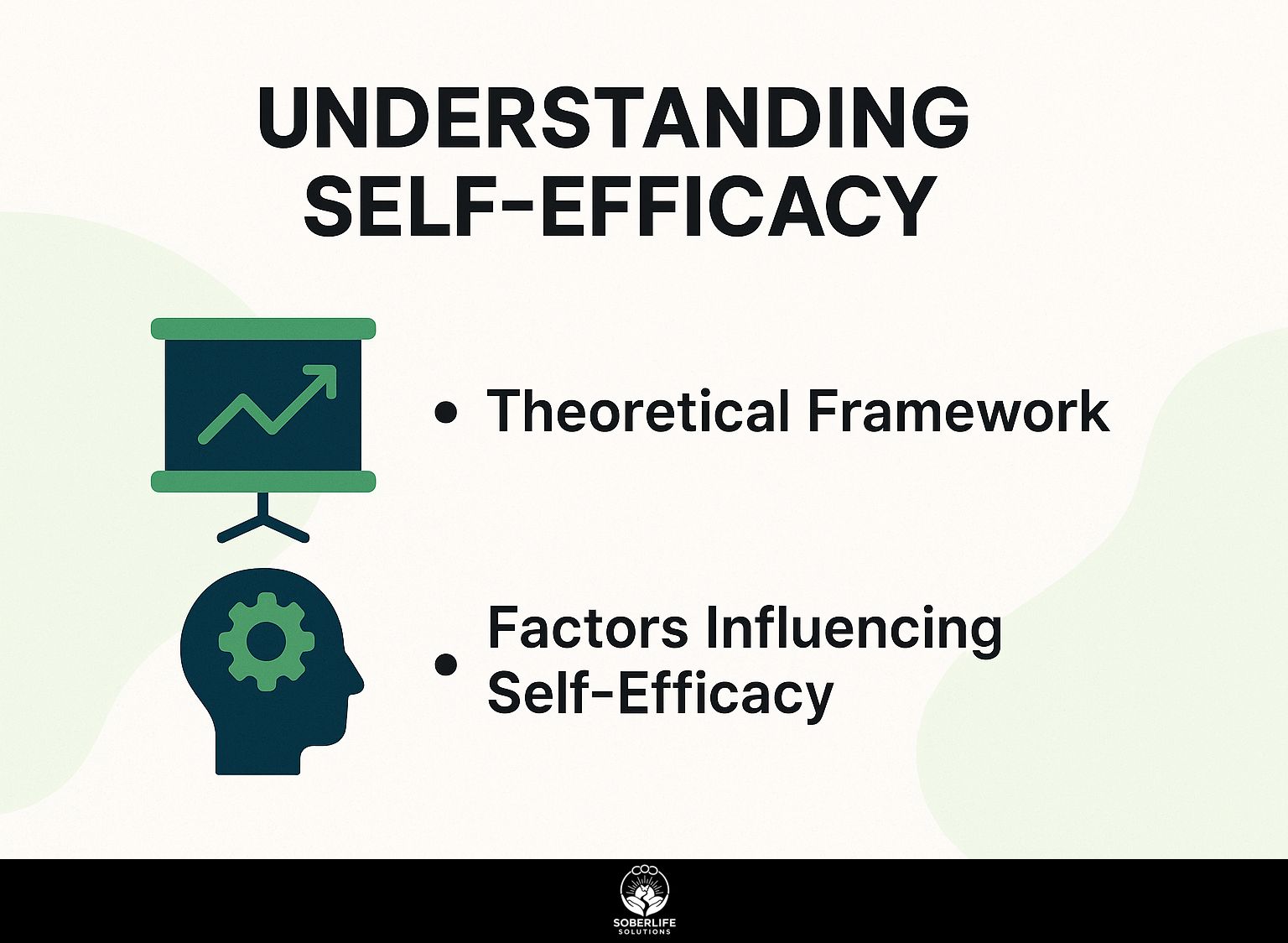
Knowing the theory of self-belief can help therapists make more effective treatment plans for clients dealing with addiction. Therapists might find it particularly beneficial to explore integrative therapies in addiction recovery, which offer diverse methods and benefits for enhancing treatment outcomes.
Theoretical Framework
Albert Bandura’s social cognitive theory posits that self-efficacy is shaped by experiences, observational learning, and social influences. For those interested in a comprehensive overview, this analysis by Wikipedia provides valuable insights into the framework of this theory.
In addiction treatment, knowing past experiences with performance is very important. People who have managed to overcome cravings before can use these past victories to strengthen their belief in handling upcoming difficulties.
Tools such as journaling can help track these achievements, emphasizing progress. Group therapy offers a space for observing others’ successes, reinforcing personal beliefs in self-efficacy.
By reflecting on these experiences and engaging with helpful communities, people can find more effective methods to handle difficulties, increasing their resilience against addiction.
Factors Influencing Self-Efficacy
Key factors such as prior experiences, social support, and emotional states significantly influence an individual’s self-efficacy levels.
These factors include:
- Prior Experiences Doing well in similar tasks increases confidence, but not doing well can decrease it. For instance, a student who excelled in math may feel prepared for advanced coursework.
- Social Support Help from friends or mentors can increase confidence. A participant in a sports team often feels more motivated due to peer support.
- Emotional Arousal: Anxiety can diminish self-efficacy; for example, a public speaker may doubt their skills when nervous.
- Observational Learning: Watching others succeed, like a colleague’s promotion, can inspire one to believe in their potential.
- Self-Talk Positive affirmations can greatly influence motivation; a runner might use mental phrases like ‘I am strong’ to improve performance.
Building Abstinence Self-Efficacy
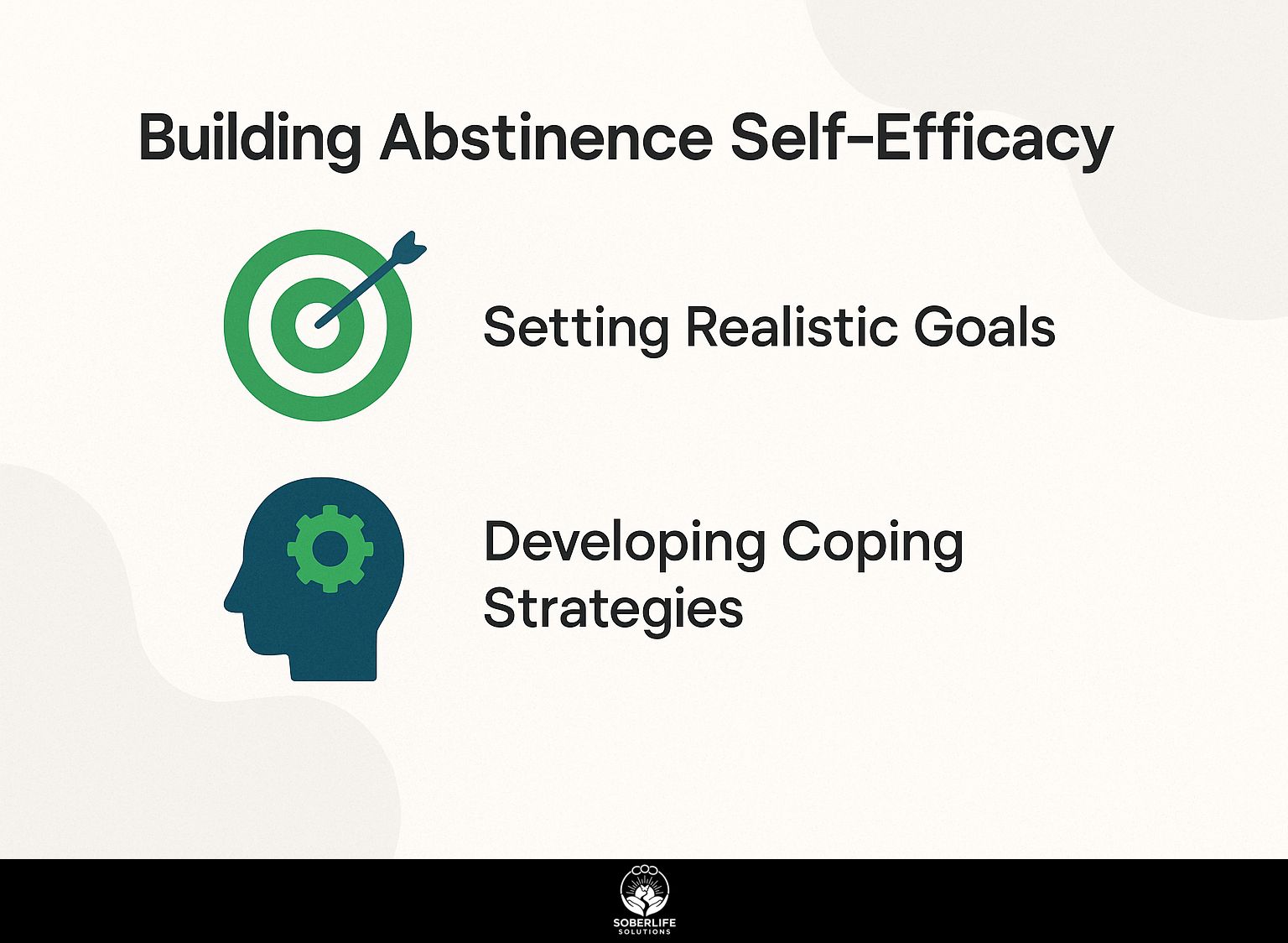
Building strong confidence in staying sober involves setting clear goals and using coping methods that match personal needs. For an extensive analysis of this trend, our comprehensive study of therapy techniques explores various strategies for relapse prevention.
Setting Realistic Goals
Setting realistic goals is essential for building confidence, as it lets people achieve success in their recovery process.
To set clear goals for staying sober that you can track, try using the SMART method: Specific, Measurable, Achievable, Relevant, and Time-bound.
For example, instead of saying `I will drink less,’ be more specific by stating `I will have no more than two drinks on weekends for the next month.’ This clear goal outlines what success means and provides a timeframe to track progress.
Checking your progress each week can increase your sense of achievement and confidence in staying sober.
Developing Coping Strategies
Having solid plans helps people manage risky situations effectively.
Mindfulness techniques can be highly effective. For example, practicing deep breathing exercises-slowly inhaling for four counts, holding for four, then exhaling for six-helps stabilize you during cravings.
Distraction tactics such as engaging in a hobby, going for a walk, or even calling a friend can redirect your focus. Keeping a list of these activities handy can serve as a useful reminder.
Using these strategies will help you become stronger and better at controlling impulses.
Practical Techniques for Enhancement
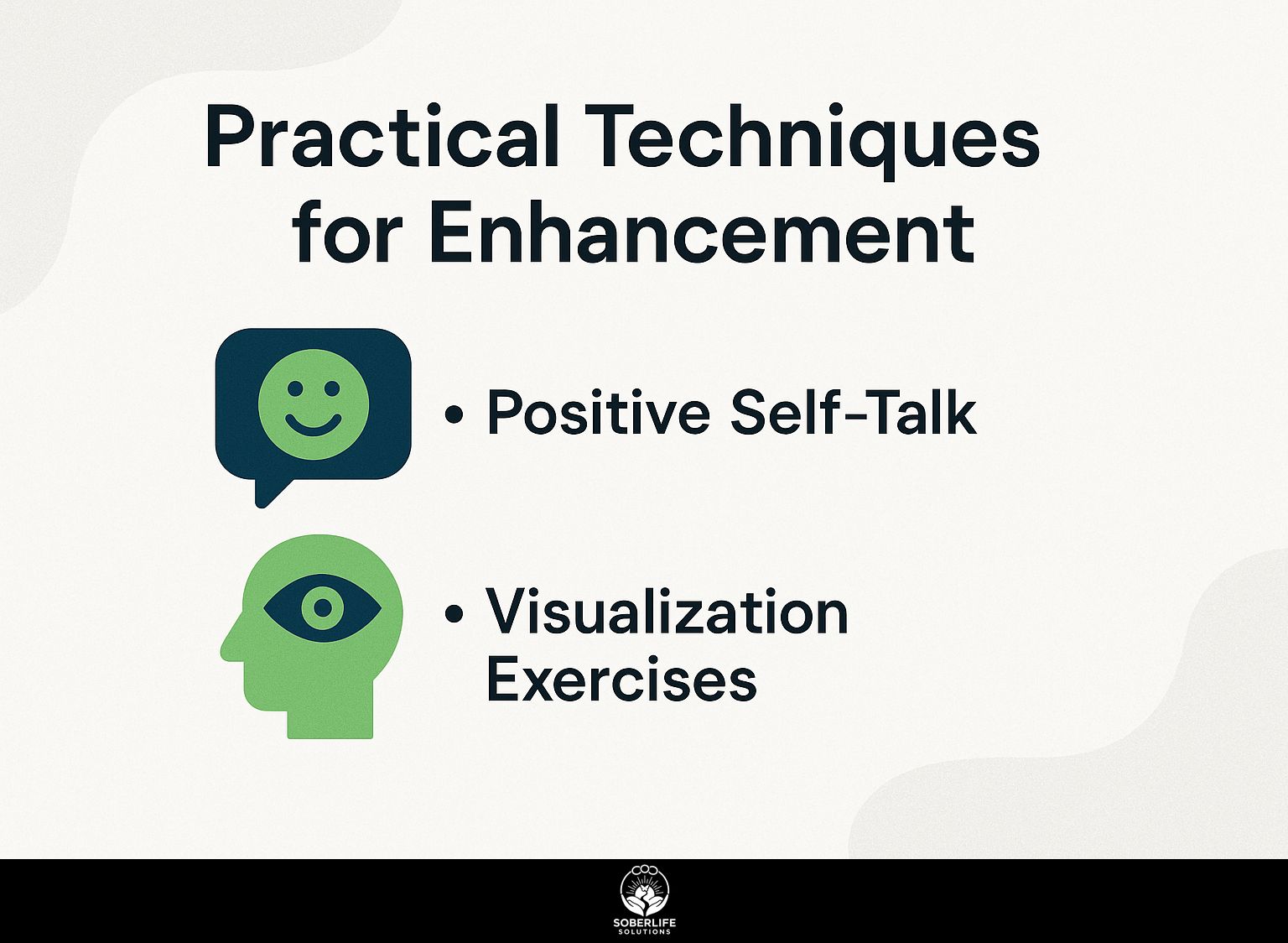
Practical methods like encouraging self-talk and visualization exercises can greatly increase a person’s confidence in staying abstinent.
Positive Self-Talk
Positive self-talk has been shown to improve confidence and reduce anxiety during critical moments, thus reinforcing self-efficacy.
To make positive self-talk a part of your daily routine, use these tips:
- Begin each day with affirmations, such as “I am capable and prepared for today’s challenges.”
- Use a digital reminder tool like Todoist to schedule these affirmations at consistent times.
- Practice cognitive restructuring by identifying negative thoughts and replacing them with constructive alternatives.
Research indicates that individuals who engage in positive self-talk report a 30% increase in perceived self-efficacy, especially when employed during stressful situations.
Visualization Exercises
Visualization exercises can help individuals mentally prepare for challenging situations, increasing their confidence and self-efficacy.
For example, practitioners can use a technique called mental imagery, where they clearly imagine themselves handling a situation well, one where they would usually have trouble staying abstinent.
Research shows that this method greatly improves self-confidence; one study found that people who practiced regular visualization felt 30% more in control of their actions.
Tools like guided meditation apps or visualization scripts can support individuals in this activity, making it simpler to include in daily habits and increase resistance to temptation.
Support Systems
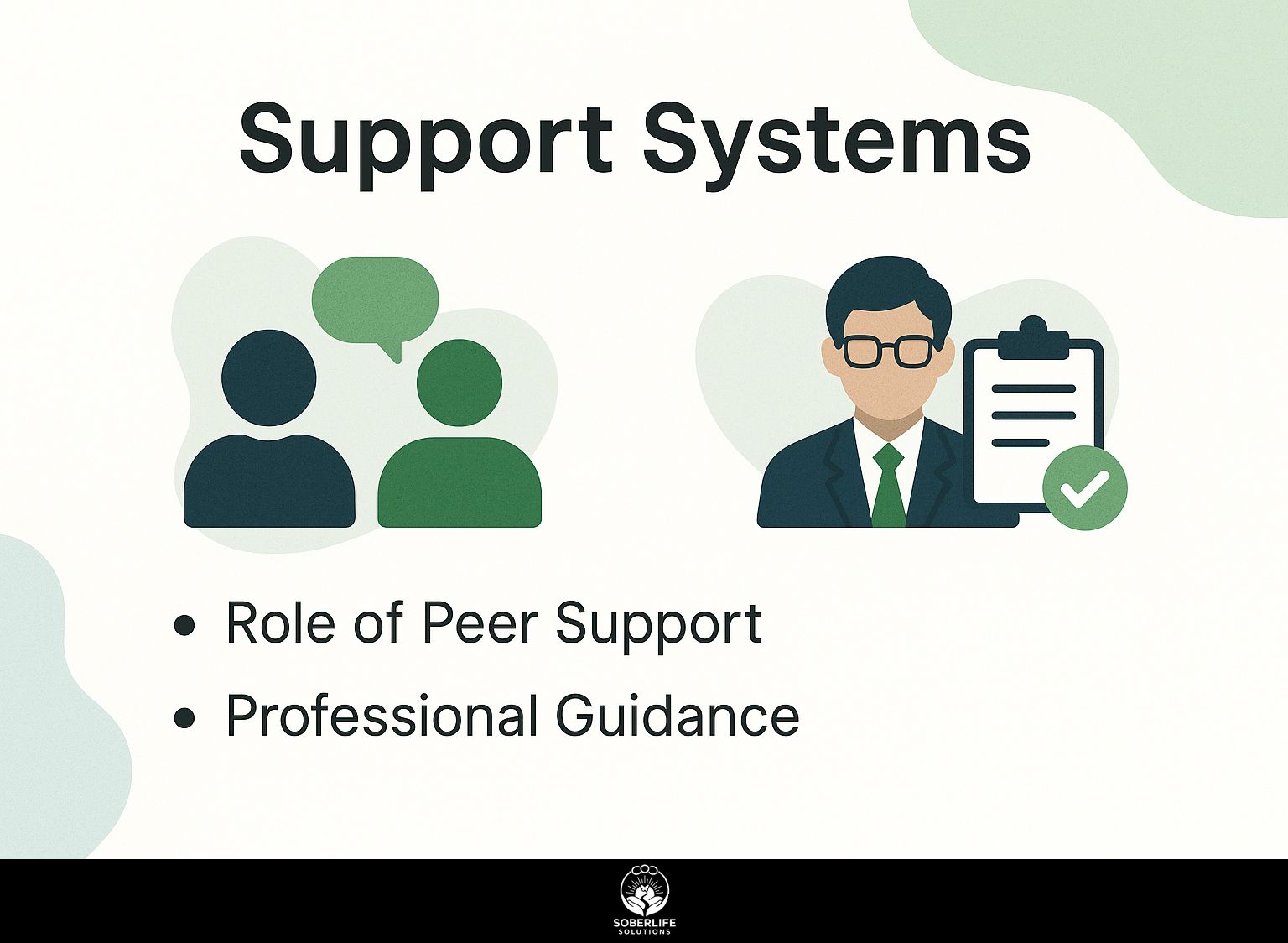
Support systems, such as help from friends and advice from professionals, are important for building confidence during recovery. It’s also essential to understand the different types of support available and how to choose the right one for your needs (our key tips for selecting a support group provide valuable guidance for this process).
Role of Peer Support
Peer support can greatly increase confidence by providing shared experiences and support during recovery.
Research shows that individuals in peer support groups report a 30% higher success rate in maintaining sobriety compared to those without such support.
Programs such as Alcoholics Anonymous (AA) and SMART Recovery offer places for people to talk about their experiences, connect with others, and feel included in a group.
Successful initiatives, such as the Recovery Community Organization (RCO), offer structured peer-led activities, mentoring, and social events.
Participating in these programs encourages dedication to recovery and creates a feeling of connection, which is important for ongoing health.
Professional Guidance
Methods like motivational interviewing can increase confidence and strengthen the relationship between therapist and client.
For example, implementing techniques such as reflective listening allows clients to express their thoughts more freely, leading to a 70% improvement in their confidence levels, according to recent studies.
Setting personal goals increases motivation. Clients who establish clear and realistic goals that can be tracked over time experience a 60% increase in success.
Using these methods can build a helpful setting that encourages confidence and involvement, eventually helping in successful therapy improvements.
Measuring Progress and Outcomes
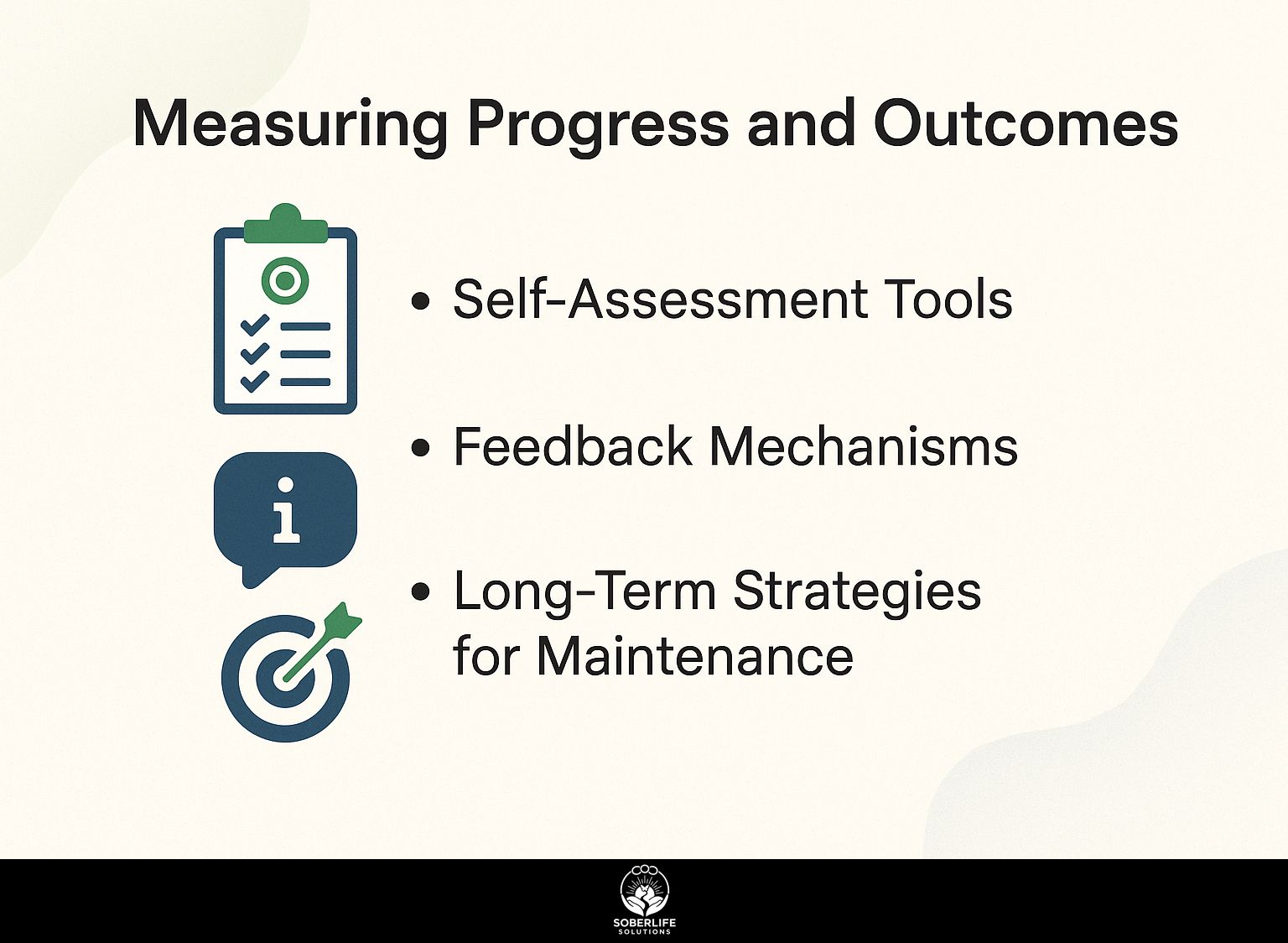
Tracking progress in self-confidence is necessary to update treatment plans and achieve successful recovery results. This approach aligns with the principles outlined in our analysis of psychologists’ techniques and their importance in recovery.
Self-Assessment Tools
Tools like the Alcohol Abstinence Self-Efficacy scale (AASE) give useful information about a person’s belief in their ability to stay sober.
- To implement the AASE, first access the scale online or through a mental health professional. Administer it regularly, ideally before starting a sobriety program, to establish a baseline.
- After completion, analyze scores to identify specific areas of confidence and concern. For example, a low confidence score in social situations may indicate a need for more targeted support in these environments.
- Use the AASE along with journaling or therapy sessions to talk about your results and create personal plans for improvement. This helps build confidence and maintain sobriety effectively.
Feedback Mechanisms
Giving effective feedback strengthens the therapeutic connection and offers useful information for both clients and therapists.
Regular check-ins and performance assessments are essential components of effective feedback mechanisms.
For example, doctors can have meetings every two weeks to discuss patient progress. This allows both the doctor and patient to deal with any issues right away. Tools like the Session Rating Scale (SRS) can be used at the start of each session to gauge client satisfaction.
For performance reviews, clinicians might use self-evaluation forms or 360-degree feedback to collect feedback from coworkers. This recurring method strengthens the therapeutic relationship and encourages ongoing progress.
Long-Term Strategies for Maintenance
Sustaining self-efficacy post-treatment requires ongoing effort, utilizing coping strategies and support systems effectively.
To keep your confidence up, join support groups that match your experiences, like local gatherings or online discussion boards.
Implement ongoing self-assessment by journaling your progress and emotions, helping you reflect on achievements and areas needing improvement.
Set goals that are clear, can be tracked, can be reached, are important, and have deadlines to guide your progress. For instance, improve a skill by practicing it for 30 minutes daily and reviewing your progress weekly.
These strategies together build a strong plan to increase confidence in oneself over time.
Frequently Asked Questions
What is abstinence self-efficacy and why is it important?
Abstinence self-efficacy is a person’s confidence in their ability to avoid giving in to temptation and stay away from a particular behavior, like using substances or engaging in harmful habits. It is important because it can greatly impact one’s ability to achieve and maintain abstinence.
How can I build my abstinence self-efficacy?
Building abstinence self-efficacy involves identifying and utilizing strategies that can help you resist temptation and stay committed to your goal of abstinence. These strategies might involve setting achievable goals, getting help from friends or family, and taking care of yourself.
Is abstinence self-efficacy the same as willpower?
No, abstinence self-efficacy and willpower are not the same. Willpower is about a person’s ability to manage their actions and urges, while abstinence self-efficacy is about how confident they are in staying abstinent.
Can abstinence self-efficacy be improved over time?
Yes, abstinence self-efficacy can be improved through practice and experience. By regularly saying no to temptation and staying away from it, people can strengthen their confidence and trust in themselves to keep doing it later.
What role does motivation play in building abstinence self-efficacy?
Motivation is important for believing in one’s ability to quit. Without a strong desire to maintain abstinence, it can be difficult to stay committed and resist temptation. Motivation can be strengthened through setting meaningful goals and reminding yourself of the reasons why you want to maintain abstinence.
Are there any resources available to help me build my abstinence self-efficacy?
Yes, there are many resources available, such as support groups, therapy, and online tools, that can help individuals build their abstinence self-efficacy. It might be useful to talk to a doctor who can give personal help and advice.

